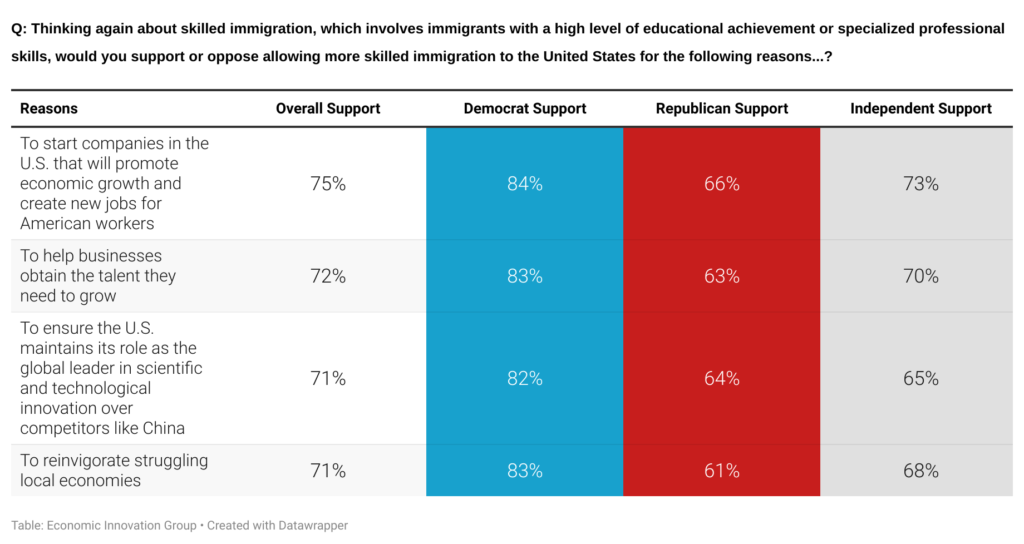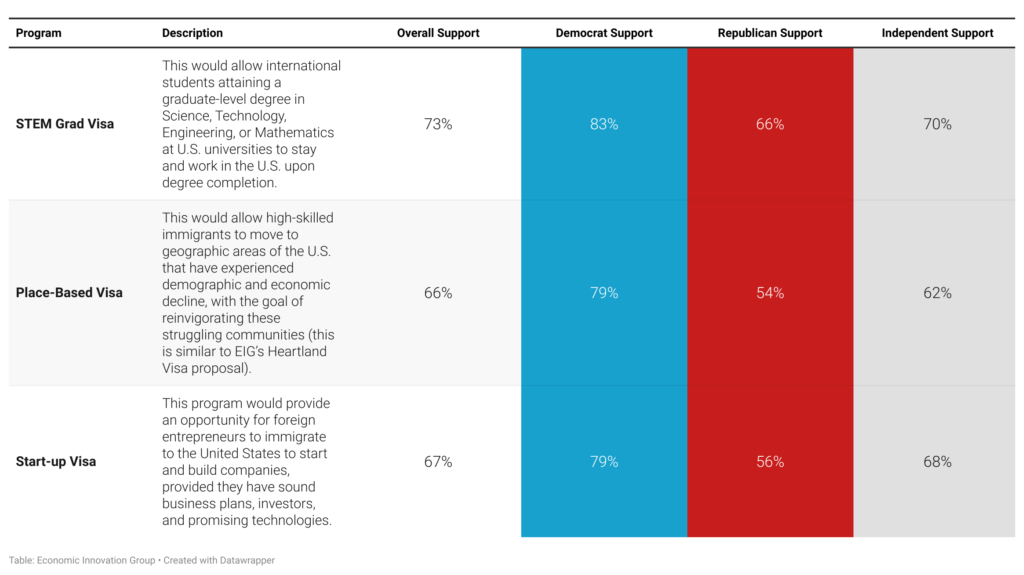By Kenneth Megan and Adam Ozimek
Bipartisan agreement on any issue is rare today, but Americans from across the political spectrum are united in support of increasing skilled immigration to the United States. That is the flagship takeaway from a first-of-its-kind national voter survey to gauge public sentiment on skilled immigration. The Economic Innovation Group, together with Echelon Insights and GBAO Strategies, surveyed over two thousand registered voters to get an in-depth look at how they respond to a range of rationales, messaging, and legislative proposals, shedding new light on how policymakers can chart a broadly popular path forward to improving the U.S. immigration system.
Key Takeaways:
- Americans are ambivalent about the national and local benefits of immigration and generally unhappy with the nature of the current system. However, seven in 10 American voters want more skilled immigration to the U.S., including 60 percent of Republicans, 83 percent of Democrats, and 72 percent of Independents.
- Voters are evenly divided on whether they believe immigration is beneficial to the national or local economy. However, large shares of voters are either unaware or unsure of the economic effects, especially at the local level, underscoring the opportunity to significantly improve public support.
- Although comprehensive immigration reform has dominated the legislative debate for many years, voters are equally supportive of taking a piecemeal approach to improving the immigration system.
- Across every category of voter, support reached its highest levels when increasing skilled immigration was linked to the idea of promoting economic growth and creating jobs for American workers. Fully three-quarters of voters responded favorably to this rationale, including large majorities of Democrats, Republicans, and Independents alike.
- The survey examined how general support for skilled immigration held up in the context of specific legislative pathways for attracting global talent. Bipartisan majorities of voters support the creation of three new visa programs to expand skilled immigration: a “Start-up Visa” to attract entrepreneurs, a “Place-based Visa” to draw global talent to support the economic development of lagging regions, and a “STEM Grad Visa” to retain international graduate students after they complete their degrees.
- Supporting increased skilled immigration carries little political risk for lawmakers. A plurality of voters (38 percent) said that they would be more likely to vote for a candidate who supports greater levels of skilled immigration, while only 18 percent said such a position would make them less likely to vote for the candidate.
Negative Voter Sentiment Surrounding the U.S. Immigration System
Americans are unhappy with the state of the U.S. immigration system—a sentiment that unifies voters in both parties. According to the survey, 66 percent of voters believe that the immigration system needs major changes or a complete overhaul, including 81 percent of Republicans, 57 percent of Democrats, and 60 percent of Independents. Bipartisan majorities of voters also want to see movement on issues that have traditionally polarized lawmakers. For example, 68 percent support an additional border patrol presence, including 56 percent of Democrats, 85 percent of Republicans, and 67 percent of Independents. Sixty-nine percent support offering a pathway to citizenship for immigrants who were brought to the U.S. illegally as children (82 percent of Democrats, 56 percent of Republicans, and 69 percent of Independents). Ultimately, nearly four-fifths of voters (78 percent) feel strongly about the need to improve immigration policy, including 82 percent of Republicans, 78 percent of Democrats, and 72 percent of Independents.
Ambivalence Surrounding the Economic Effects of Immigration
The survey revealed that voters are split regarding the economic effects of immigration—despite an overwhelming body of evidence that demonstrates the strong value-add immigrants provide to economic growth and dynamism. This ambivalence extends to both the national and local levels. Thirty-eight percent of voters believe that immigration has a positive impact on the national economy, while 37 percent believe the impact to be negative. Views about immigration at a local level are equally divided but less entrenched: Twenty-eight percent believe immigration has a positive economic impact in their local community, while an identical share believe that the impact is negative.
Ultimately, only 56 percent of respondents believe that immigration has either a positive or negative impact on their local economy, which provides an opening for stakeholders, advocates, and policymakers to make a positive local economic case for immigration, such as by demonstrating that it can help declining areas shift to growth again.
Bipartisan Support for Increasing Skilled Immigration
Not only did the survey display that the public wants changes to the immigration system, it also found strong bipartisan backing for expanding pathways for skilled immigration in particular. Specifically, 71 percent of voters are supportive of more skilled immigrants coming to the United States (defined as those with a high level of educational achievement or specialized professional skills), including 60 percent of Republicans, 83 percent of Democrats, and 72 percent of Independents.
The survey found that voters support skilled immigration for a number of reasons (see the chart below for details), and that the concept resonates particularly strongly when it is tied to American job creation. However, our findings suggest that the framing matters a great deal, perhaps because the characteristics of skilled immigration remain ambiguous for many voters. For example, the poll asked several questions about immigrant entrepreneurs, including if voters would support, “allowing more immigrant entrepreneurs who want to start businesses in the United States to come here.” This framing received a relatively lukewarm response—in particular among Republicans. (It received 59 percent support overall, 74 percent among Democrats, 46 percent among Republicans, and 55 percent among Independents.)
However, when asked if voters would support increasing the number of skilled immigrants so that they can “start companies in the United States that will promote economic growth and create new jobs for American workers” support increased across the board, including by 20 percentage points among Republicans (to 75 percent overall, 84 percent among Democrats, 66 percent among Republicans, and 73 percent among Independents). Importantly, this represents an opportunity for stakeholders to make a positive case for skilled immigration that is backed by research, given that immigrants are 80 percent more likely to start companies relative to native-born Americans, and immigrants have founded over half of startups worth $1 billion or greater.

Equal Support for Comprehensive and Piecemeal Immigration Reform
While the debate in Washington has long been dominated by an “everything-at-once” approach to immigration reform, the survey found that voters are equally supportive of policymakers taking a piecemeal approach. Specifically, 41 percent of respondents believe that any step towards immigration policy reform is favorable over none, while 43 percent of respondents would not accept individual reforms unless larger issues—such as border security and undocumented immigrants—are also addressed. Of those who would favor a piecemeal approach, 83 percent support increasing the number of skilled immigrants in the United States, support that is shared by 67 percent of voters who want comprehensive reform.
Types of Voters who Support and Oppose Skilled Immigration
While the survey found support for skilled immigration to be broad-based and bipartisan, several clear characteristics differentiate the majority of voters who support it and the minority who oppose it. We utilized regression analysis to disentangle the independent effects of various voter characteristics on opposing skilled immigration. In general, support for skilled immigration is positively correlated with the education level of voters; a rural-urban divide also exists and, surprisingly, at a similar magnitude to the divide between older (more in favor) and younger (less in favor).
Republicans overall support more skilled immigration, but, among those voters who are opposed, by far the strongest predictor of opposition is having voted for Donald Trump in the 2020 election (although it should be noted that 60 percent of Trump voters are in favor of increasing skilled immigration). Voters opposed to skilled immigration are also more likely to think that the immigration system needs a complete overhaul.
Note: Values reflect regression coefficients
Little Risk for Candidates Who Support Skilled Immigration
The survey found that a plurality of voters (38 percent) would be more likely to vote for a candidate who includes skilled immigration in their platform, though support skews towards Democrats (53 percent of Democrats would be more supportive, compared to 25 percent of Republicans, and 30 percent of Independents). Further, supporting skilled immigration was found to carry little political risk, as just 12 percent of Democrats, 28 percent of Republicans, and 13 percent of Independents indicated that they would be less likely to vote for a candidate who supports additional skilled immigration.
A skilled immigration platform would not affect the vote of 37 percent of voters (41 percent of Republicans, 30 percent of Democrats, and 45 percent of Independents), further underscoring the voter ambivalence on this issue and the potential for stakeholders and policymakers to move public opinion.
Policy Options for Reform
The survey tested three novel policy options for increasing skilled immigration, all of which received strong bipartisan support. Voters were most enthusiastic about the idea of a STEM Grad Visa, which would allow eligible international students to stay and work in the United States after finishing their graduate degrees. Additionally, with bipartisan majorities, two-thirds of voters were supportive of Place-Based Visas to reinvigorate local communities, and a Startup Visa for foreign entrepreneurs to build their companies in the United States. In short, voter enthusiasm for skilled immigration is not limited to one specific type of policy proposal, but instead holds true across a range of distinct legislative options.

Conclusion
This survey contains several key takeaways for policymakers and stakeholders interested in skilled immigration reform. It found broad, bipartisan support for increasing skilled immigration, and revealed that voters are equally open to a piecemeal approach to reform relative to a comprehensive overhaul of the system. Importantly, the poll showed strong support for an array of policy approaches that would boost skilled immigration, including a place-based program that would inject global talent into struggling regions of the country and new pathways for foreign-born entrepreneurs to start and build new companies in the United States. Finally, the survey illuminated broad ambivalence among voters on the economic effects of immigration – particularly at the local level.
Ultimately, American voters are both eager for change and more closely aligned on immigration policy than the rhetoric in Washington suggests, providing lawmakers with an opportunity to work across the aisle and articulate a positive vision for skilled immigration focused on economic growth, dynamism, and entrepreneurship.
Survey Details:
This poll was conducted by Echelon Insights and GBAO Strategies. It surveyed 2,025 registered voters, had a margin of error of +/- 2.6 percentage points and was conducted in August 2022. This is the first post-pandemic, in-depth survey of American voter’s views on skilled immigration and the creation of three new visa pathways for skilled and entrepreneurial immigrants. Explore the topline survey results and methodology here.






